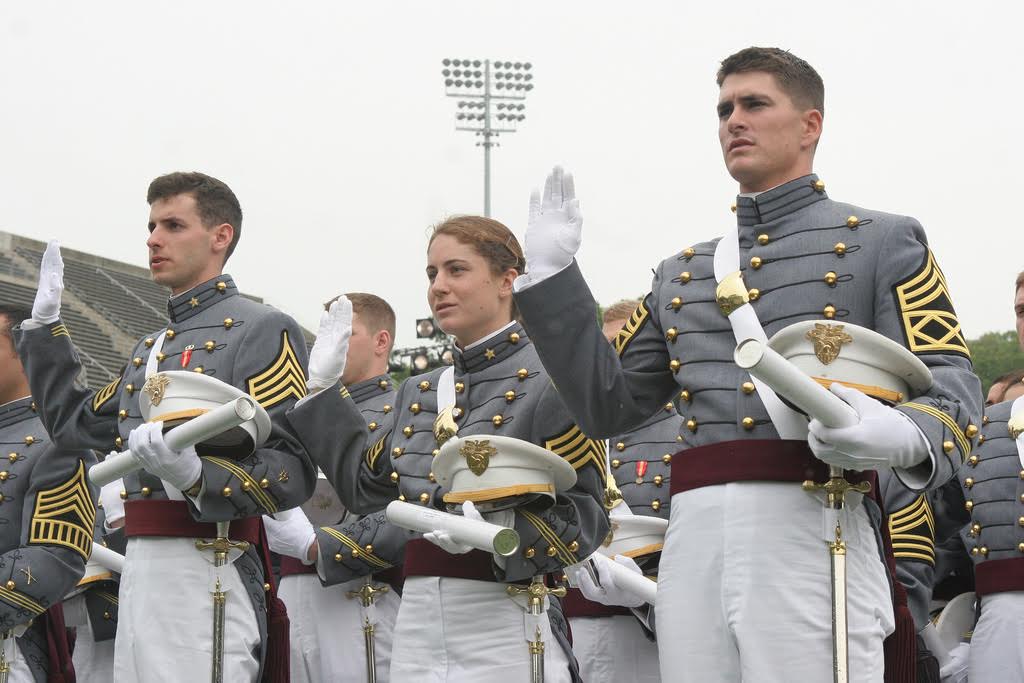
The American Military and the Consequences of the Presidential Election
By Christina Bartzokis
“I, [name], do solemnly swear (or affirm) that I will support and defend the Constitution of the United States against all enemies, foreign and domestic; that I will bear true faith and allegiance to the same; that I take this obligation freely, without any mental reservation or purpose of evasion; and that I will well and faithfully discharge the duties of the office upon which I am about to enter. So help me God.”
– United States Uniformed Services Oath of Office
[divider]
[dropcap]A[/dropcap]t the end of last year, Donald Trump said that he believed that the United States (US) should target the families of ISIL fighters. He also advocated torture “worse than waterboarding” when interrogating detainees. Days later, Ted Cruz proposed “carpet bombing” ISIL, adding, “I don’t know if sand can glow in the dark, but we’re going to find out!” Both candidates’ policies are war crimes. The US is party to Geneva Convention IV (1949), which protects civilians against military action and would be violated by indiscriminate targeting through carpet-bombing cities or targeting combatants’ family members. Similarly, Geneva’s Common Article Three prohibits “violence to life and person” and “outrages upon personal dignity” of prisoners of war. Facing criticism, both candidates backpedalled on some points. Nevertheless, the fact that presidential candidates would consider such strategies raises the possibility that our future president could order the US military to commit war crimes. In that situation, what would our nation’s military officers be legally obligated to do – or not do?
The legal foundation for individual decision-making in the military is rooted in the first moments of a soldier’s career, which the Oath of Office or Enlistment. Both oaths bind soldiers to “protect and defend the Constitution of the United States.” This phrase is interpreted by advocates of international law as a legal obligation to abide by international treaties, since treaties are the “supreme law of the land” under Article Six of the Constitution. The prohibition of war crimes has also been integrated into US law under the War Crimes Act of 1996, prohibiting a “grave breach of the Geneva Conventions.” Military personnel are also bound to follow the Uniform Code of Military Justice (UCMJ), Article 90, which states that soldiers are only obligated to obey lawful orders.
These restrictions are based on the assumption that if soldiers are ordered to commit war crimes, their orders are unlawful – in which case they are obligated to refuse. However, since the federal government can internally interpret international law, some actions that are internationally considered war crimes could be legal domestically. For example, the George W. Bush administration argued that waterboarding was not a war crime, since detainees could not be classified as enemy combatants due to their lack of state affiliation. The legal cover afforded to soldiers who disobey unlawful orders would not necessarily protect a soldier who refused to waterboard a detainee. In fact, Donald Trump has stated that he would not give soldiers unlawful orders – he plans to find legal cover for his proposals first.
Even if orders are legal, military officers may still have a legal justification for refusing them. The Oath of Enlistment includes a vow to “obey the orders of the President of the United States and the orders of the officers appointed over me.” Therefore, an enlisted soldier who refused to follow a legal order would likely be sentenced for insubordination. Officers, however, never swear to obey their superior officers or the Commander-in-Chief. They swear to “well and faithfully discharge the duties of the office upon which I am about to enter.” The wording of this statement seems to place officers’ moral responsibilities over their legal obligation. If officers are given an order that they believe is in violation of the moral and ethical standards of their office – a violation of the “duties of [their] office” – they have an obligation to refuse. Thus, officers may have a legal defense for disobeying lawful orders that they believe to be immoral.
It is difficult to predict how military personnel would actually react when faced with the policies posited by Trump and Cruz. Gen. Michael Hayden (ret.) told Bill Maher that, “the American armed forces would refuse to act.” Others argue that history indicates a different outcome. The military is committed to civilian control of the armed forces, so there have been few instances when officers have refused the orders of civilian officials. There was military resistance to the Bush administration’s manipulation of the law to justify torture, but it was conveyed through a variety of strongly worded memos. There were no resignations and no known refusals.
Difficult moral choices are inherent in war, a challenge for soldiers under any president, but perhaps especially under Trump or Cruz. By sparking a renewed conversation about the relationship between morals and orders in the military, this election has led current and future soldiers to revisit the Oath and its implications for their legal and moral choices. The response is not unified: some military personnel support Trump or Cruz. A Military Times poll of subscribers found that Trump was the favorite in the general election among soldiers, with 27% of soldiers’ votes. However, other soldiers have already begun discussing their moral and legal imperatives in relation to orders. Many, like a staff sergeant at Fort Bragg, believe that their moral obligations will prevent them from following the policies that Trump and Cruz have advocated for. The staff sergeant told the New York Daily News, “If I face a court martial, I face a court martial.”
[hr]
Christina Bartzokis is a sophomore in Jonathan Edwards college. You can contact her at christina.bartzokis@yale.edu